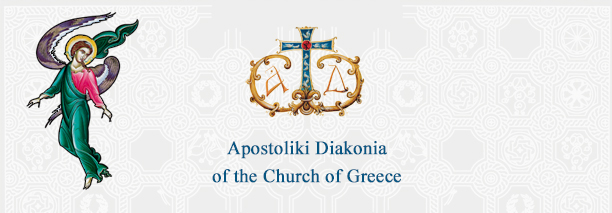THE SACRAMENT OF BAPTISM
Christ and the Church is a god-man organisation, a god-man body, the head of which is Christ and the body is "the entire Church". The church is characterised as the "body of Christ" not only as a metaphorical image; the phrase means "this body of Christ, absolutely ontologically thought of". As Holy Chrysostom says: Christ "mentions himself to us; and he creates in Him not only our faith but indeed our body." The faithful become part of him and partake of His flesh and as the body is united with the head, they are thus united and 'one Christ' is made up of all them." "Everybody becomes one Christ, being members of his body."
In order to express the god-man unity of Christ and the Church in depth, Apostle Paul calls the Church the fullness of Christ. "The fullness of Christ is the Church. And rightly for the complement of the head is the body and the complement of the body is the head... the head, as it were, filled up by the body...the body is composed and made up of all its several parts. Then is the head filled up, then is the body rendered perfect, when we are all knit together and united."
The meaning of fullness includes the characterisation of the Church as the "people of God". All the people of God belong to the fullness of the Church of Christ; "the faithful found anywhere in the world; the faithful that are already, the ones in the process of becoming and the ones that will become." The fullness of Christ also means the unity "in Him" of the earthly and heavenly kingdom which is expressed in the Divine Eucharist.
The entire Church and each individual member put on the garment of Christ through Baptism and lives through Him, because He "lives in His body and the body lives through Him." "And he is our fullness and path and man and bridegroom; and root and drink and food and life; and apostle and archpriest and teacher and father and brother and coheir and communicant in grave and in cross; and our intercessor and advocate in front of the Father; and house and tenant and friend; and foundation stone and corner stone; and we are His members and field and built and branches and accomplices."
This new relation of men with God is felt as a common experience in the organic unity and harmonious operation of the one body -"for in one Spirit we were all baptised in one body... Now you are Christ's body, and individually parts of it" (Corinthians 1:12, 12 ff)-, in which the "old aeon" is restored, the new reality of the world in Christ is taking place and is experienced by the faithful and the " present aeon" is united with the " future aeon" in salvation history ( Romans 5:12-21).
Baptism, therefore, is not something concerning the priest and the person who is baptised, the beginning of an individual path, but the whole Church, the entire Eucharist communion. "All of us who have been baptized into Christ Jesus were baptized into his death... and have been united with him like this in his death " (Romans 6: 3-5). The holy Sacraments are organic operations and expressions of the Body of the Church, like the members of the heart, the branches of the tree, the branches of the vine, as St. Nicholas Kavasilas characteristically notes. Man encounters God; the uncreated grace embraces and makes the created nature immortal within the divine worship, the holy sacraments and the sacred rites. The worshipping ministration is not simply a beautiful ritual tradition, but the revelation and realisation of the true life through the dynamics of the "points" of the realistic symbolism of our Church.
May God make us worthy so that our participation in the sacraments of the Church is participation in life. |
